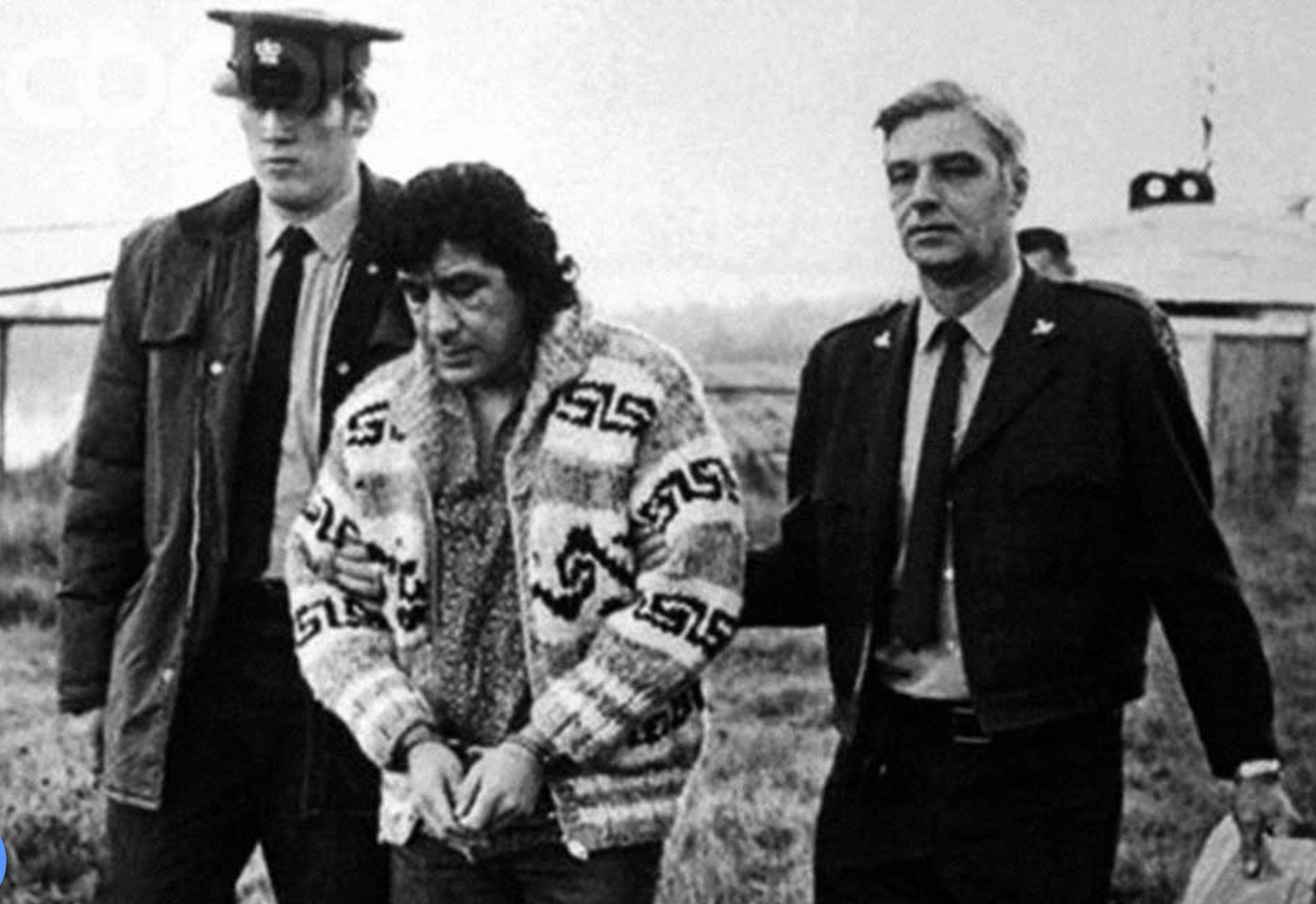
- Details
- By Levi Rickert Neely Bardwell
This Day in History – Feb. 6, 1976. Forty-nine years ago today, February 6, 1976, Leonard Peltier (Turtle Mountain Ojibwe) was arrested in western Canada. His arrest was based on a warrant issued by the United States for his alleged involvement in the June 26, 1975, shooting deaths of two FBI agents, Jack Coler and Ronald Williams, on the Pine Ridge Indian Reservation in South Dakota.
On January 19, 2025, President Joe Biden commuted his sentences to home confinement just before exiting office. Peltier will be released on February 18, 2025 from the United States Penitentiary, Coleman, a high-security prison, in Coleman, Fla., where he is serving two consecutive life sentences for the killing of the two FBI agents.
On February 6, 1976, Peltier, an activist and member of the American Indian Movement (AIM), was arrested in Hinton, Alberta, Canada by the Royal Canadian Mounted Police (RCMP). “Since this day of my capture by the Royal Canadian Mounted Police, my life has become one unending blue of jails and prisons...Handcuffs and leg irons and strip searcher –’spread’m, Tonto’-- have become my daily routine,” Peltier wrote in “Prison Writings: My Life is a Sun Dance.”
At the time, Peltier had fled to Canada following the incident at the Jumping Bull Ranch, where a shootout had occurred between AIM members and FBI agents. The U.S. government sought his extradition, claiming he had played a key role in the deaths of the agents.
Peltier was extradited to the United States on December 18, 1976, after the U.S. government presented affidavits from Myrtle Poor Bear, a Lakota woman who claimed to have been an eyewitness to the killings.
Also, in “Prison Writings: My Life is a Sun Dance,” Peltier wrote:
“I had not the slightest idea who this woman was, having never met or even heard of her in my life. She, like me, like each and every one of us, was a pawn in the government’s illegal and malicious game.”
During Peltier’s fight for extradition from Canada, Poor Bear’s testimony was enough for the Canadian government to extradite Peltier to the United States to stand trial. However, she later recanted her statements, stating that they had been coerced by the FBI and that she never even met Peltier.
Despite significant controversy surrounding his trial, including allegations of misconduct and withheld evidence, Peltier was convicted of first-degree murder in 1977 and sentenced to two consecutive life terms.
His case has since become a focal point for human rights activists and members of Congress, who argued that he was unjustly convicted and called for his release.
Help us tell the stories that could save Native languages and food traditions
At a critical moment for Indian Country, Native News Online is embarking on our most ambitious reporting project yet: "Cultivating Culture," a three-year investigation into two forces shaping Native community survival—food sovereignty and language revitalization.
The devastating impact of COVID-19 accelerated the loss of Native elders and with them, irreplaceable cultural knowledge. Yet across tribal communities, innovative leaders are fighting back, reclaiming traditional food systems and breathing new life into Native languages. These aren't just cultural preservation efforts—they're powerful pathways to community health, healing, and resilience.
Our dedicated reporting team will spend three years documenting these stories through on-the-ground reporting in 18 tribal communities, producing over 200 in-depth stories, 18 podcast episodes, and multimedia content that amplifies Indigenous voices. We'll show policymakers, funders, and allies how cultural restoration directly impacts physical and mental wellness while celebrating successful models of sovereignty and self-determination.
This isn't corporate media parachuting into Indian Country for a quick story. This is sustained, relationship-based journalism by Native reporters who understand these communities. It's "Warrior Journalism"—fearless reporting that serves the 5.5 million readers who depend on us for news that mainstream media often ignores.
We need your help right now. While we've secured partial funding, we're still $450,000 short of our three-year budget. Our immediate goal is $25,000 this month to keep this critical work moving forward—funding reporter salaries, travel to remote communities, photography, and the deep reporting these stories deserve.
Every dollar directly supports Indigenous journalists telling Indigenous stories. Whether it's $5 or $50, your contribution ensures these vital narratives of resilience, innovation, and hope don't disappear into silence.
 The stakes couldn't be higher. Native languages are being lost at an alarming rate. Food insecurity plagues many tribal communities. But solutions are emerging, and these stories need to be told.
The stakes couldn't be higher. Native languages are being lost at an alarming rate. Food insecurity plagues many tribal communities. But solutions are emerging, and these stories need to be told.
Support independent Native journalism. Fund the stories that matter.
Levi Rickert (Potawatomi), Editor & Publisher
